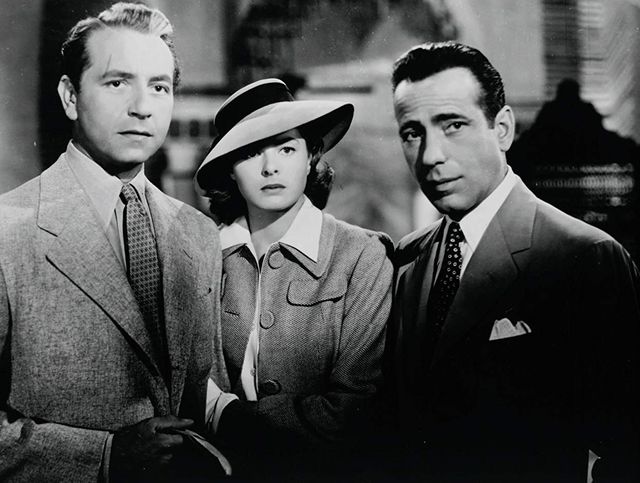Casablanca turned 80 years old this past week. It is often cited by critics as one of the best films ever made, and it is easy to see why: Witty dialog, humor, romance, action, Casablanca has it all. Yet what keeps Casablanca relevant after all these years is something that goes beyond its surface merits. At its heart, Casablanca is a film about virtue.
The word virtue is not one we hear often in popular culture these days. Most people either associate the word with faux gentility, or with people showing off their agreement with fashionable social causes via “virtue signaling.” But virtue is not about false displays of moral superiority. The Catechism says, “A virtue is an habitual and firm disposition to do the good.” Human beings are hard-wired to form habits. It is what allows us to do things like drive a car or speak our native language without thinking about it. We do things often enough, and they become second nature to us. They become a part of who we are. If those habits are good, they are called virtues. If they are bad, they are called vices.
At first glance, Casablanca seems more concerned with vice than virtue. Set during World War II in the Moroccan city that is its namesake, the film centers on Rick Blaine (Humphrey Bogart), an American who runs a bar and casino where an international clientele comes to make black market deals, gamble, and drink away their sorrows. Casablanca was controlled by Vichy, the so-called “free French,” who collaborated with the Nazis and were therefore under their thumb. People trying to escape the violence in Europe and Africa often found themselves stuck in Casablanca, waiting for exit visas that would never arrive.
Rick makes it clear that he is uninterested in the sob stories of those who come his way looking for help or a handout. “I stick my neck out for nobody,” he says more than once. When the Nazi Major Strasser (Conrad Veidt) asks Rick his nationality, he says, “I’m a drunkard.” This prompts his friend, the corrupt Vichy police chief Louis Renault, played by the inimitable Claude Rains, to quip, “That makes Rick a citizen of the world.” Rick boasts of having no convictions. When he learns that a famous Czech member of the underground resistance named Victor Laszlo (Paul Henreid) will be arriving in Casablanca, he bets Louis 10,000 francs that Laszlo will find a way to escape the city, but he later tells Major Strasser that his “interest in whether Victor Laszlo stays or goes is purely a sporting one.”
Even before the revelation that Laszlo’s wife is Ilsa Lund (Ingrid Bergman), Rick’s long lost love, there are signs that Rick may have been a different kind of man in the past. Louis accuses Rick of being a secret sentimentalist because of his history of fighting against fascism years earlier in Ethiopia and Spain. Rick assures Louis that those actions were all done for money. Rick projects an image of himself as an unfeeling, self-interested shark, yet that image falls to pieces once Ilsa is suddenly back in his life. Over and over, we see Rick performing small acts of kindness and courage. He refuses money from a German banker. After a young Bulgarian woman tells him she will have to give her body to Louis for a visa because she has no money, he rigs the roulette table so that her husband can win big. When Louis forces Rick to shut the doors of his bar for a time, Rick insists that every member of the staff be kept on the payroll. (Read more.)
I Love Lent
1 week ago


















No comments:
Post a Comment